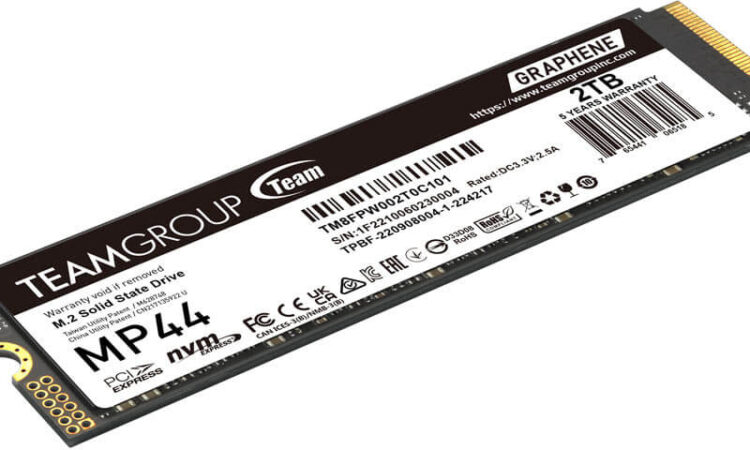TEAMGROUP are an emerging brand in the consumer SSD market. Besides a wide range of SSDs, their lineup includes an impressive array of DDR5 RAM, as well as memory cards, USB drives and peripherals. They provided a sample for the MP44 M.2 PCIe 4.0 2TB SSD for review and testing. The MP44 SSD is available in 512GB, 1TB, 2TB, 4TB, and a capacious 8TB size.
All of the MP44 SSDs are backed by a five year warranty and the 2TB drive we tested is rated for 2500TBW endurance.
Both input/output operations per second (IOPS) and throughput are very important metrics for measuring data storage performance for SSDs.
IOPS, pronounced “eye ops,” is the measurement of the number of input/output operations a storage device can complete within a single second. The IOPS stats for the 2TB drive are read up to 650K and write up to 660K. The drive has a maximum read speed of 7,400 MB/s, and sequential write of 6,400 MB/s.
The SSD uses the MaxioTech MAP1602 controller. That’s the same controller TEAMGROUP uses for their Z44A7 which we’ve previously reviewed. The controller offers good performance and excellent power efficiency in testing. The controller is a 4-channel, 12nm design that can push the limits of PCIe 4.0 with its 2400 MT/s bus.
The SSD uses a graphene heatsink which enhances heat dissipation performance and enables better system operating stability. We put the SSD under extremely heavy workloads, hammering it with sequential writes for more than an hour and had no issues with stability on both an Intel 13th gen desktop machine and an Intel NUC.

Here are the specs for the 2TB SSD.
Specifications
| MP44 2TB M.2 NVMe SSD | |
|---|---|
| Brand | TEAMGROUP |
| Model: | MP44 |
| Form Factor: | M.2 2280 |
| Capacity: | 2TB (512GB, 1TB, 4TB and 8TB capacities are also available) |
| Controller | MaxioTech MAP1602 |
| DRAM Cache: | No |
| Endurance | 2500 TBW (2TB) model |
| MTBF: | 1,600,000 Hours |
| Interface | PCIe Gen 4 x4, NVMe 1.4 |
| Warranty: | 5 years |
| Price: | $123.99 |
Next page: Page 2 – Benchmarks
Pages in this article:
Page 1 – Introduction and Specifications
Page 2 – Benchmarks
Page 3 – Summary

